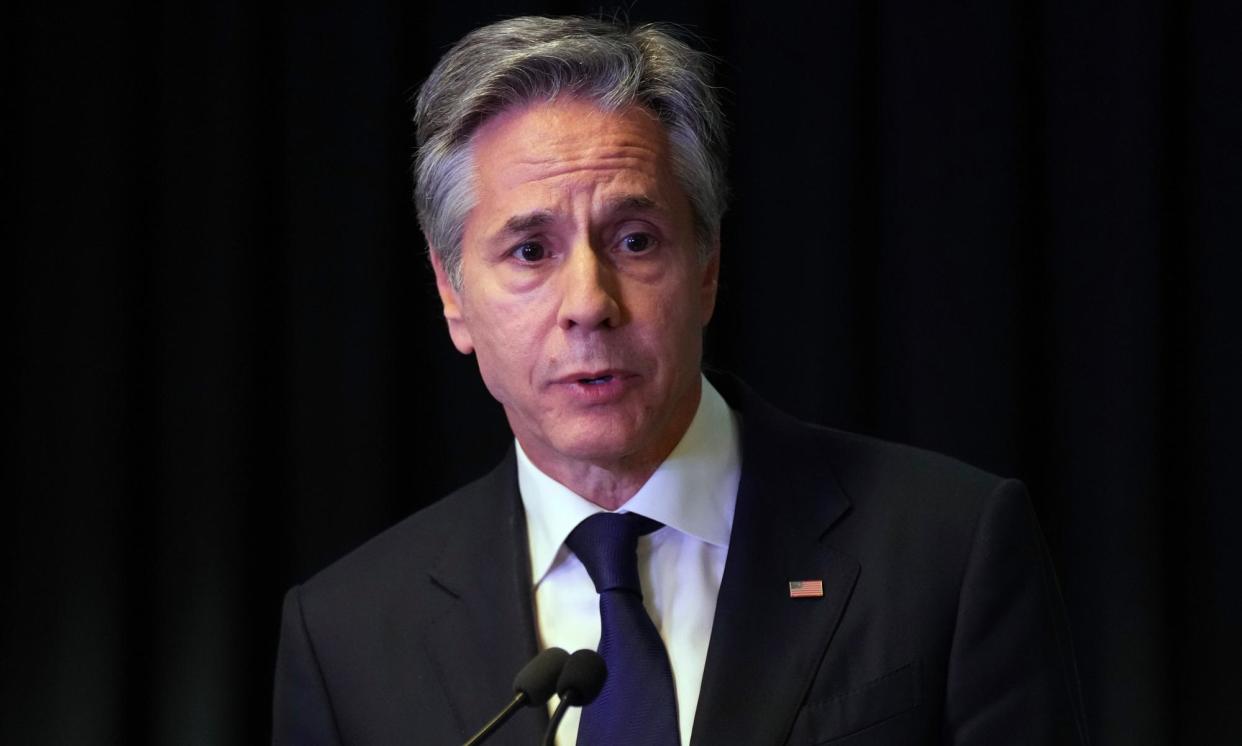Antony Blinken to visit Saudi Arabia to try to restart Gaza ceasefire talks

Antony Blinken will travel to Saudi Arabia to try to restart fraught ceasefire negotiations in Gaza, as a delegation from Hamas, expected in Cairo in parallel to the US secretary of state’s visit, said they would provide a response to an Israeli proposal focused on an initial hostage release.
Pressure on international mediators has mounted to secure a swift deal, amid fears of a looming Israeli ground invasion of Rafah in southern Gaza, where over a million people are now believed to be sheltering. The move risks sounding the death knell on talks to free hostages or find a diplomatic solution to end the conflict.
Joe Biden spoke again with Benjamin Netanyahu on Sunday and reiterated his “clear position” opposing an Israeli invasion of Rafah, the White House said.
Meanwhile, the food aid organisation World Central Kitchen (WCK) said it would resume operations in Gaza less than a month after an Israeli attack killed seven of its workers, saying it was keen to “get as much food into Gaza, including northern Gaza, as possible”.
WCK said 276 trucks were waiting to enter via the Rafah crossing, adding it was exploring using a maritime corridor to deliver aid amid reports that the US military had begun construction of a floating pier off the coast of the territory.
Blinken is due to arrive in Riyadh on Monday for diplomatic talks on the sidelines of the World Economic Forum, to discuss ceasefire negotiations and humanitarian assistance to Gaza.
Egyptian officials have stepped up their own efforts to mediate talks between Hamas and Israel, after a new proposal that would initially see a small number of hostages held in Gaza released in exchange for Palestinians in the territory to be able to return to their homes.
An Egyptian official told Associated Press that mediators were working on a compromise solution to answer both parties’ main concerns, intended to set the stage for further negotiations to end the war entirely.
The US news site Axios said Israeli officials were open to discussing the return of Palestinians to their homes in northern Gaza, and the withdrawal of Israeli troops from a central corridor that divides the territory. Discussions around a “sustainable ceasefire” could take place in a second phase of negotiations, after an initial hostage release, it added.
Hamas took 250 people hostage on 7 October, when the group attacked towns and kibbutzim around Gaza in an unprecedented attack that killed 1,136. In the months since, Israeli bombardments of Gaza have killed an estimated 34,000 people and levelled most urban centres.
Intense negotiations mediated by Qatar and Egypt led to the release of 105 hostages in an initial deal last November. In the months since, Hamas said it was unwilling to compromise on the full withdrawal of Israeli troops from Gaza and a permanent ceasefire.
As Egypt stepped up mediation efforts, Majed al-Ansari, the Qatari foreign ministry spokesperson and adviser to the prime minister, gave a rare interview to the Israeli media outlet Haaretz discussing Doha’s continuing frustrations with the negotiations, indicating the chance of a swift deal could be remote.
“We were hoping to see more commitment and more seriousness on both sides,” he said. “We are, with the help of our international partners, hoping that we can pressure both sides to an agreement, but right now we are seeing from both sides a lot of lack of commitment to the process itself and to the mediation.”
In Riyadh, the Saudi Arabian foreign minister, Prince Faisal bin Farhan bin Abdullah, chaired a meeting with his counterparts from Jordan and Egypt as well as diplomats from Qatar, the UAE and the Palestinian Liberation Organisation to discuss a ceasefire in Gaza and efforts to achieve an independent Palestinian state.
The president of the Palestinian Authority, Mahmoud Abbas, warned in an address at the World Economic Forum that ground troops entering Rafah could cause mass displacement and “the biggest catastrophe in the Palestinian people’s history”.
“We call on the United States of America to ask Israel to not carry on the Rafah attack,” he said. “America is the only country able to prevent Israel from committing this crime.”
Related: Is there about to be a breakthrough in the Gaza ceasefire talks?
The Israel Defense Forces said its chief of staff, Lt Gen Herzi Halevi, had approved “plans for the continuation of the war” in a meeting with the head of the IDF’s southern command, while Israeli ministers issued competing demands of the prime minister, Netanyahu, over a potential ceasefire deal.
Benny Gantz, a leading official in Netanyahu’s war cabinet, said the government “will have no right to continue to exist and lead the campaign” if it did not agree to a deal that could see the return of the hostages.
He added that the deal should be “responsible” and supported by the Israeli security services, but should “not involve ending the war”.
Israel’s far-right finance minister, Bezalel Smotrich, issued a counter message to Netanyahu, calling the potential Egyptian ceasefire deal “humiliating surrender”.
Smotrich warned Netanyahu that declining to attack Rafah risked his withdrawal from the governing coalition, and the collapse of the government. “If you decide to raise a white flag and cancel the order to occupy Rafah immediately … the government headed by you will have no right to exist,” he said.
Associated Press contributed to this report

 Yahoo News
Yahoo News 
